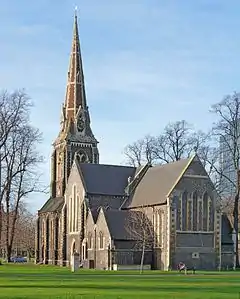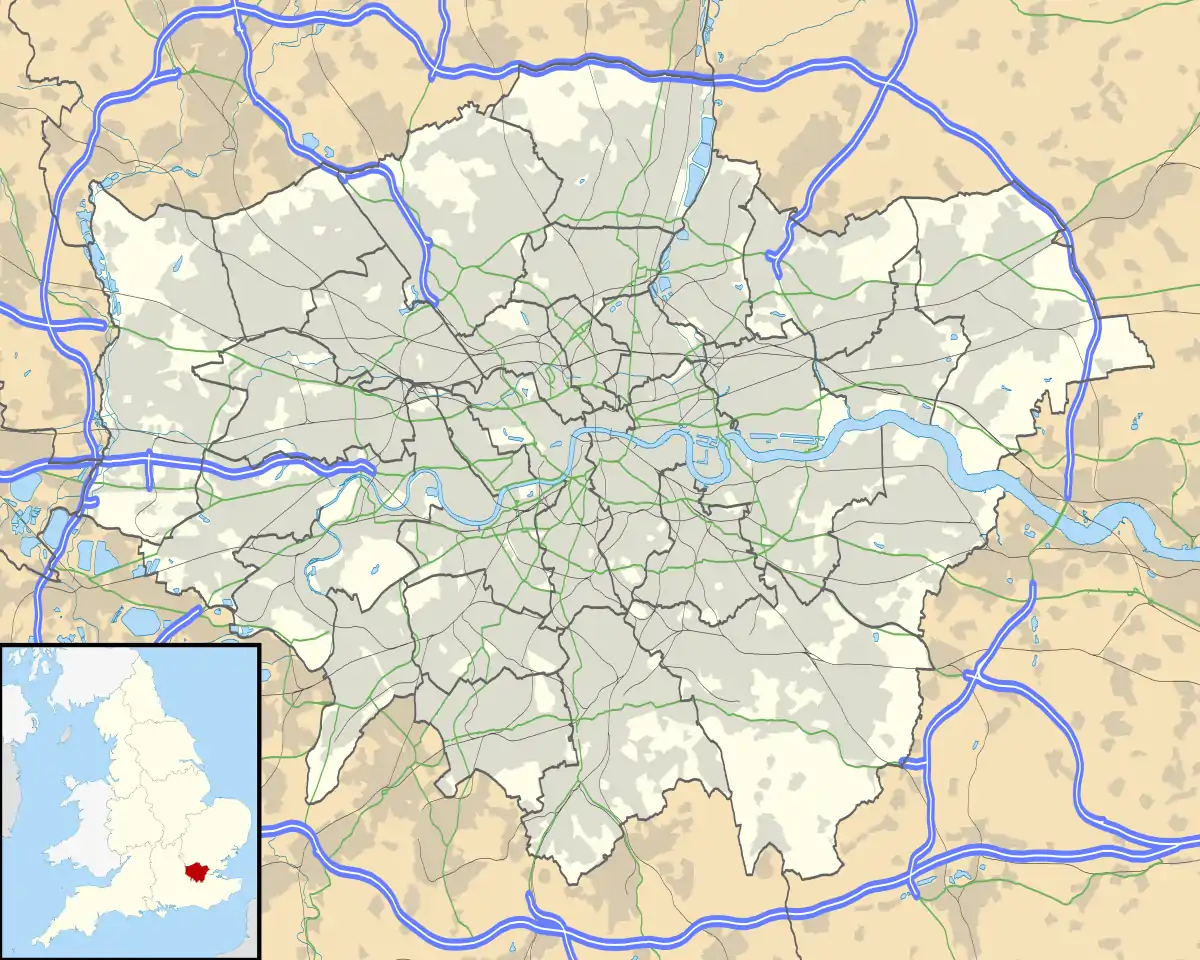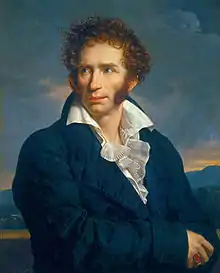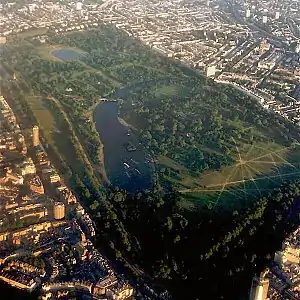Turnham Green
Turnham Green is a public park situated on Chiswick High Road, Chiswick, London. It is divided by a small road. Christ Church, a neo-Gothic building designed by George Gilbert Scott and built in 1843,[2] stands on the eastern half of the green. A war memorial stands on the eastern corner. On the south side is the old Chiswick Town Hall.
| Turnham Green | |
|---|---|
 Christ Church, Turnham Green | |
 Turnham Green Location within Greater London | |
| Population | 11,448 (2011 Census. Ward)[1] |
| OS grid reference | TQ212786 |
| London borough | |
| Ceremonial county | Greater London |
| Region | |
| Country | England |
| Sovereign state | United Kingdom |
| Post town | LONDON |
| Postcode district | W4 |
| Dialling code | 020 |
| Police | Metropolitan |
| Fire | London |
| Ambulance | London |
| UK Parliament | |
| London Assembly | |
The green is the site of local community events, including a travelling funfair, church events and charity table-top sales.
The nearest London Underground station is Chiswick Park on the District line.
Turnham Green tube station is actually situated on Chiswick Common, some 1 km (0.6 mi) to the east, on a street named Turnham Green Terrace which does not touch the park it is named after.
History
Turnham Green was a village on the main road between London and the west. It was recorded as 'Turneham' in 1235 and 'Turnhamgrene' in 1369.[3]
On 13 November 1642, the Battle of Turnham Green was fought nearby during the First English Civil War resulting in the Parliamentarians blocking the King's advance on London.[4]
In 1680 the homicidal Philip Herbert, 7th Earl of Pembroke murdered a watchman, William Smeeth, after a drunken evening in the local tavern.[5] A similar but far less serious episode in the tavern, the Old Packhorse Inn, in 1795 saw the young Daniel O'Connell arrested for drunken and riotous behaviour.[6]
From 1912 until its closure in 1959, the Chiswick Empire theatre overlooked Turnham Green.[7]
War memorial
At the eastern end of Turnham Green stands Chiswick war memorial. It is in the form of a stone obelisk at the top of a flight of five steps, encircled by a metal fence and a yew hedge. It was unveiled on 13 November 1921 by the 9th Duke of Devonshire and Arthur Winnington-Ingram, the Bishop of London. It is made of Cornish granite. It was designed by a local architect, Edward Willis. It was given Grade II listed status in 2015.[8]
Christ Church
In the middle of the green stands the tall Christ Church, Turnham Green, designed in the Gothic revival style by George Gilbert Scott and opened in 1843. The chancel was extended in 1887.[9]
In culture
Highwayman
The 18th century highwayman broadside ballad "Alan Tyne of Harrow" includes the couplet:[10]
- "One night by Turnham Green I robbed a revenue collector,
and what I took from him I gave to a widow to protect her".[10]
- "One night by Turnham Green I robbed a revenue collector,
The novel A Tale of Two Cities by Charles Dickens mentions "that magnificent potentate, the Lord Mayor of London, [who] was made to stand and deliver on Turnham Green, by one highwayman, who despoiled the illustrious creature in sight of all his retinue."[11]
Other mentions
The song "Suite In C" on the eponymous album McDonald and Giles, which alludes to places in London, includes the line "The sun shone 'til Turnham Green".[12]
The song "Junkie Doll" by Mark Knopfler includes the line "Turnham green, Turnham green, You took me high as I've ever been"[13]
Residents

- Edward Adey, abolitionist, was born here in 1799.[14]
- Peter Brook, director, born here in 1925 and grew up at 27 Fairfax Road.[15]
- E. M. Forster, novelist, lived at 9 Arlington Park Mansions on Turnham Green[16] from 1939 until at least 1961.[17]
- Ugo Foscolo, Venetian writer and poet, key figure of Italian Neoclassicism and Romanticism, died here in 1827.[18]
- Patsy Hendren, (1899-1962), cricketer, born here.[19]
References
- "Hounslow Ward population 2011". Neighbourhood Statistics. Office for National Statistics. Retrieved 24 October 2016.
- Robbins, Michael (2003). Middlesex. Phillimore. p. 234. ISBN 978-1-86077-269-6.
- Clegg, Gillian: "The Chiswick Book", Historical Publications Ltd, 2004, ISBN 0-948667-96-6.
- Robinson , Wayne. "The Battle of Turnham Green, November 13, 1642"/ 29 April 2010. — official site of The Pike and Musket Society
- David L. Smith, 'The infamous seventh earl of Pembroke, 1653–1683' (a sub-section of 'Herbert, Philip, first earl of Montgomery and fourth earl of Pembroke (1584–1650), courtier and politician') in Oxford Dictionary of National Biography (OUP, 2004)
- Geoghegan, Patrick M. (2008). King Dan Daniel O'Connell 1775-1829: The Rise of King Dan. Gill Books. pp. 50–51. ISBN 978-0-7171-5156-1.
- Pain, Christina (2001). "The Chiswick Empire". Brentford and Chiswick Local History Journal (10).
- Historic England. "Chiswick War Memorial (1424996)". National Heritage List for England. Retrieved 5 December 2017.
- Bolton, Diane K.; Croot, Patricia E. C.; Hicks, M. A. (1982). Baker, T. F. T.; Elrington, C. R. (eds.). A History of the County of Middlesex: Volume 7. London: Victoria County History. pp. 90–93.
- "(Alan) Tyne of Harrow / Valentine O'Hara". Mainly Norfolk: English Folk and Other Good Music. Archived from the original on 8 July 2017. Retrieved 11 May 2018.
- Charles Dickens, A Tale of Two Cities Book I, ch. I.
- "McDonald and Giles - Suite in C Lyrics". SongLyrics. Retrieved 11 May 2018.
- Mark Knopfler – Junkie Doll, retrieved 19 June 2018
- The American quarterly register, American Education Society, 1841, p200, accessed April 2009
- Michael Kustow (17 October 2013). Peter Brook: A Biography. A&C Black. pp. 5–7. ISBN 978-1-4088-5228-6. Retrieved 20 July 2015.
- Moffat, Wendy (2011). E. M. Forster: A New Life. Bloomsbury. ISBN 9781408824276.
- "E.M. Forster 9 Arlington Park Mansions, Sutton Lane, Chiswick, London". Notable Abodes. 2011. Retrieved 23 May 2013.
- Gentleman's Magazine and Historical Review Volume 97, Part 2. 1827. pp. 566–569. Retrieved 21 May 2013.
- "England / Players / Patsy Hendren". ESPN. Retrieved 14 November 2018.
| Wikimedia Commons has media related to Turnham Green. |

